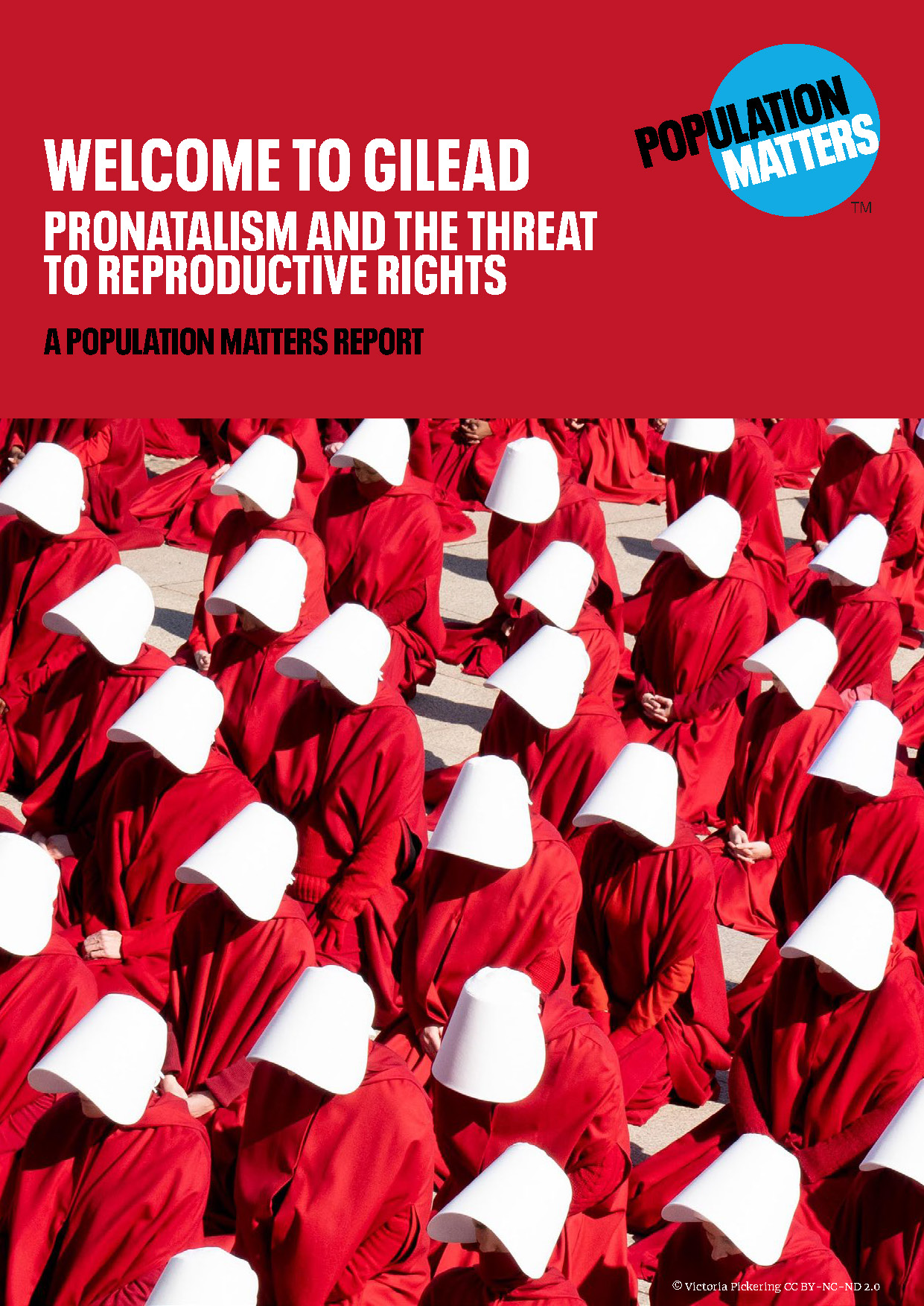
Welcome to Gilead: how population fears drive women’s rights abuses
Welcome to Gilead, Population Matters’ latest report, expands on the connections between extreme pronatalism and reproductive rights restrictions through eight case studies: Iran, China, Turkey, Russia, Hungary, Poland, Germany, and the US. The report’s author, PM Researcher and Policy Adviser Monica Scigliano, explains.

Coercive pronatalism
As those of us who fight for women’s rights know, concerns with population growth have been abused to justify appalling reproductive rights violations like forced sterilisations, particularly in vulnerable communities. Now, as the populations of many countries are declining, a political disregard for bodily autonomy is again rearing its ugly head, though this time with the aim of forcing women to have more, not fewer, children.
Pronatalism – the promotion of childbearing – is not, in and of itself, coercive. However, rights-affirming versions of pronatalism, like providing more statutory parental leave, rarely result in higher birth rates, and some politicians have turned to a more extreme, politically convenient, and less expensive strategy: restricting reproductive rights.
A toxic mix of nationalism, xenophobia and racism
A variety of concerns motivate the pronatal leaders and political influencers of these countries. Many have explicitly nationalist agendas. Hungary’s Prime Minister Orbán and Germany’s AfD party, for example, promote the racist and xenophobic Great Replacement Theory, claiming that “indigenous” women must have more children to save European civilisation from extinction. Former US Congressman Steve King justified his opposition to free contraceptives on the grounds that “Preventing babies from being born is not medicine. That’s not constructive to our culture and our civilization. If we let our birth rate get down below the replacement rate we are a dying civilization”.
In some cases, governments separately encourage population growth among the majority group while discouraging it among minorities, whom they see as a threat. China, for instance, focuses its increasingly coercive pronatalism on educated, middle class Han people, while subjecting minorities like Uyghurs to forced long-term contraception and abortions. And Hungarian Prime Minister Viktor Orbán is explicit in his selective desire for population growth: “Instead of just numbers, we want Hungarian children. Migration for us is surrender”.
Some, like Iran’s Ayatollah Khamenei and Russia’s Putin, see low fertility rates (particularly among the religious or ethnic majority group) as a national security threat. Iran, for instance, recently tasked its Ministry of Intelligence with monitoring abortion after parliamentarian Nasrollah Pejmanfar claimed that “The enemy has been implementing a consistent plan to reduce the birthrate”. The Russian government, meanwhile, is considering labeling the childfree movement an “extremist ideology”, and President Putin has stated that “Russia’s fate and its historic prospects… depends on how many children are born in Russian families”.

Economic growth at all cost
Other leaders are worried about the economic costs of supporting an ageing population. A number of conservative American lawmakers, for example, aim to make abortion illegal and contraception more costly while also warning of the ‘disastrous’ economic effects of low birth rates. They frame their views in positive terms like ‘pro-life’ and ‘pro-family’, but their voting records on policies like universal childcare tell another story.
China’s leadership is particularly concerned about the effects of demographic change on its labour force. According to Leta Hong Fincher, “The Chinese government aggressively perpetuates traditional gender norms and reduces women to their roles as dutiful wives, mothers and baby breeders in the home, to minimize social unrest and give birth to future generations of skilled workers… policymakers continue to view women primarily as reproductive tools to realize the nation’s development goals”.
In Turkey, a blend of economic concerns and nationalism fuel President Erdoğan’s intense pronatalism. He has called abortions “secret plots designed to stall Turkey’s economic growth and a conspiracy to wipe the Turkish nation from the world stage”.


Violated rights
In each of the countries explored in this report, reproductive rights are under attack by the same politicians who aim to increase birth rates. Iran has recently outlawed free contraceptives and elective sterilisation. In China, childfree men are often unable to obtain vasectomies. The AKP, Turkey’s ruling party, has made contraception difficult to access in much of the country. In Russia, women have to go through a longer waiting period and biased counseling, sometimes with a priest, before they are granted an abortion. Hungary has made medical abortion illegal and requires a prescription for emergency contraception. Perhaps the most egregious offender is Poland, which among a host of other regressive measures has enacted a near-total ban on abortion. Antonina Lewandowska of the Federation for Women and Family Planning, Poland, says,
“The Polish pronatalist movement drove doctors into such a state of fear that they would rather let the patient go into septic shock than terminate the pregnancy earlier and save her life. They are terrified of prosecution and stigma, as the pro-natalist/anti-choice movements would probably eat them alive.
On the other hand, there is a group of medical professionals that are rather comfortable with the current situation, as it lets them argue that medical negligence happens due to that “freezing effect” of an abhorrent law rather then their own incompetence, mistake or deliberate choice to not provide their patients with necessary medical care – an abortion – due to their personal beliefs. But in both cases, it is clear – aggressive, fundamentalist pronatalism paved the way for violating human rights in Poland.”
Germany and the US – the most democratic countries featured in the report – aren’t spared, either. A Nazi-era law in Germany prevents healthcare providers from publicising information on abortions, and the battle for the right to abortion rages in a number of American states – with the Supreme Court preparing to hear oral arguments on Mississippi’s law this week.
In some cases, these new restrictions have led to slightly higher rates of unwanted births. The much more pervasive effect, however, is greater human suffering as girls and women resort to unsafe illegal abortions or face greater maternal mortality risks from unintended pregnancies. From a population perspective, extreme pronatalism is not actually particularly relevant. The reason it matters is because peoples’ health, freedom, and lives are at stake – and a fixation on the anti-natalist coercion of the past may prevent us from effectively countering the reproductive rights violations of today.
Download the report
Learn more about how pronatal policies are threatening reproductive rights across the world in our fully referenced report.

